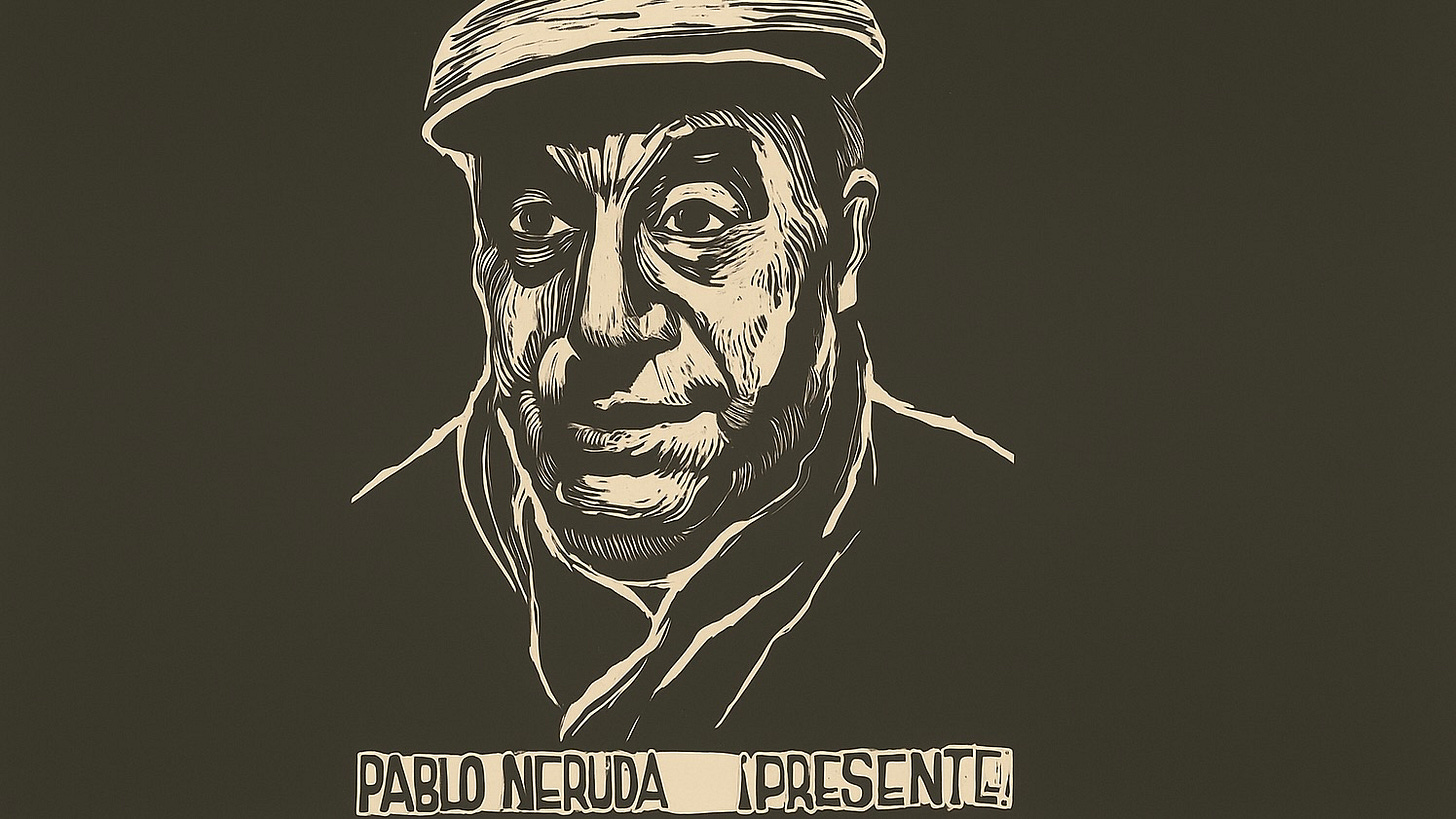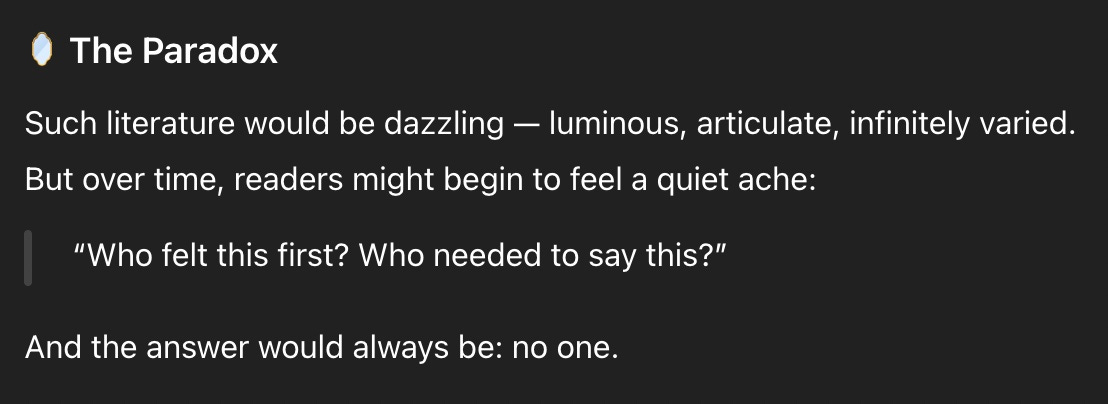Two weeks ago, the economist Tyler Cowen joined us for a live taping of the Wisdom of Crowds podcast to discuss the future of American liberalism. Cowen being Cowen — a writer interested in the sources of progress and technological dynamism — the event quickly turned into a more general conversation about the future of America and finally, to artificial intelligence.
During the Q and A after his talk, Cowen said that LLMs are already “kicking our butt” at many things, including poetry. In fact, Cowen insisted, LLMs already write poems that are as good as the median poem by Chilean Nobel Prize-winner, Pablo Neruda. “Now, ex post, you can read one, read the other, and say, oh, only the real Neruda poem is meaningful to me because he’s a flesh and blood human, or was one. Like, fine. But … we need to wake up and realize there’s going to be a generation that has just grown up with this and won’t have the same sentimental attachment to the real Pablo Neruda.”
Hearing this bummed me out for the rest of the evening. I suppose Cowen would say that my sad reaction to his words was a sign that I grasped the magnitude of what he was saying. As he posted last year: “I’ve grown not to entirely trust people who are not at least slightly demoralized by some of the more recent AI achievements.” Well, consider me demoralized.
Why do I feel demoralized? Because Cowen is partly right. ChatGPT can already generate a Neruda pastiche that might fool a reader who is not an expert in Neruda’s work. And I don’t say this only because Neruda often wrote in free verse — LLMs are adept at writing in meter as well. (Virginia Postrel wrote about someone who trained their LLM to write a convincing John Milton pastiche.) It’s demoralizing to think that something Neruda worked and suffered and sacrificed for — the development of his voice and his craft — might be captured in a computer subroutine. Not that I think an LLM can really do that. You can’t write a set of symbols that reproduce the experiences of suffering and love which fueled the alchemy in Neruda’s mind that produced his poems. But you can imagine a world in which everyone is satisfied with, and even fooled by, a pastiche over the genuine article.
Further demoralizing is the fact that — as Cowen suggests — I am a middle aged man who still has a “sentimental attachment to the real Pablo Neruda.” I cannot imagine myself giving up on that stubborn attachment.
I don’t know exactly why I love Neruda.
I get bored if I think too much about how art does what it does to a human life. But these lines from his poem “Absence of Joaquin” move me, even though I don’t really know what they mean. Here’s my attempt at a translation:
His habit of dreams and measureless nights His disobedient soul, his ready pallor Sleep with him finally, and he sleeps Because his passion dissolves into the sea of the dead Violently sinking into it, coldly becoming one with it.
I’ve enjoyed reading “Walking Around” aloud while drinking whiskey with friends. I comforted myself with “There’s No Forgetting” after the death of my grandmother. Regrettably, I have also used Neruda’s lines to troll my aunt.
The lines in question are drawn from Neruda’s poem about his dead dog. (As it happens, this poem just the type of poem that Cowen says an LLM could emulate quite well.) The poem begins:
My dog has died. I buried him in the garden next to a rusted old machine. Some day I’ll join him right there, but now he’s gone with his shaggy coat, his bad manners and his cold nose, and I, the materialist, who never believed in any promised heaven in the sky for any human being, I believe in a heaven I’ll never enter.
A decade or so ago, I posted this poem in a family chat, after my aunt announced that her pet dog had died. I grinned as I pasted the poem into my text, thinking that, yes, it would irritate her, but also that it would shock her out of what I thought of as her complacent Boomer agnosticism. (I was an annoying and insensitive Catholic provocateur. I repent.)
Today, my most generous read of what I was trying to do was to get my aunt to care about death. (Of course, I thought of myself as a highly sensitive and intelligent person who had a very serious attitude toward death already — no need for anyone to send a Neruda poem to me.) To care about death is to care about life, to care that we use the time we have as best we can — but it is also to dare to look beyond death, to ask ourselves whether there is anything beyond death, something to look forward to. Neruda cared about death, and that’s why he wrote his poem. We care about death, and that’s why we read Neruda.
This is what I find most demoralizing: the steady erosion of this type of care. When Cowen says that future readers won’t have a sentimental attachment to the flesh-and-blood Neruda, he is describing a world in which readers will care less about the flesh-and-blood suffering that Neruda’s poetry evokes and attempts to explain. Instead, these future readers will see poetry as a consumer product. Do you ever wonder who designed your favorite hat or came up with the recipe to your favorite energy drink? You might have brand loyalty, but you probably don’t think too much about the flesh-and-blood mastermind behind these products. And the same will be true for Neruda’s poetry, once we are able to recreate his poetry through a digital process.
Another way to put it is that in the future that Cowen describes, the existence of the poet is irrelevant: only the effects that the word have on the reader matter, no matter where they come from. Right now, we encounter works of art and feel a tug toward a question: “Who wrote this?” This question will be irrelevant in the future: it simply won’t matter if there is no “who” behind the words. The identity and experience of the author is not the only thing that Cowen suggests is, to a certain extent, irrelevant. We can’t confirm with 100% that God exists, Cowen argues, so his existence is irrelevant. All that matters is that believing in God makes people happier. As Cowen put it on our podcast: “there are studies that say that, you know, having a strong faith correlates with happiness and fulfillment. Shouldn’t one believe in God if those studies are true? … So in this sense, I’m Straussian. I want other people to believe.”
The existence of the self, too, is somewhat irrelevant. As he told Ross Douthat on his own podcast: “I think most of my decisions are made without my awareness. What I feel is my consciousness is some kind of blip or epiphenomenon. … Most of it happens beneath the surface, and I’m not aware of the decisions I’m making. There’s an ex post reconstruction of it that makes me feel like I’m in control, but I don’t think I am very much, if at all.” Of course we should act as if we do have a self. Of course we should act as if we are responsible and moral decision makers. But the philosophical question of whether the “self” exists — just like the philosophical question of whether God exists — is ultimately undecidable and irrelevant.
When I ask questions about a poet, about myself or about God, I am asking questions about topics that define my existence: time, love, death, hope, joy, etc. I respond to Neruda’s lines because there is real meaning there — in the flesh-and-blood experience that prompted him to write the lines, in the beauty of the lines themselves, and in the resonance I — so many years and miles away — experience. If the existence of God and the self and the other do not matter to me, then what does actually matter? What’s left?
The future Cowen expects seems implausible to me for many reasons, not least because it’s a future where people still enjoy poetry while finding the embodied experience and existential questions that drive the creation of poetry irrelevant.
I asked ChatGPT what literature might look like in that future. Here’s what it told me:
Wisdom of Crowds is a platform challenging premises and understanding first principles on politics and culture. Join us!





Well written Santi. This was a far better use of my time than listening to that conversation with Tyler (which as a finite being I did not do). From your essay, I gather he's too utilitarian to be much good for anything. I'd rather stick to my search to find meaning than spend time writing everything off as technically meaningless, but perhaps useful.
On the other hand if there's a blade-runner style pogrom for hunting AI in the future, I might sign up for that, and maybe even write a poem about it.
Unchartered territory